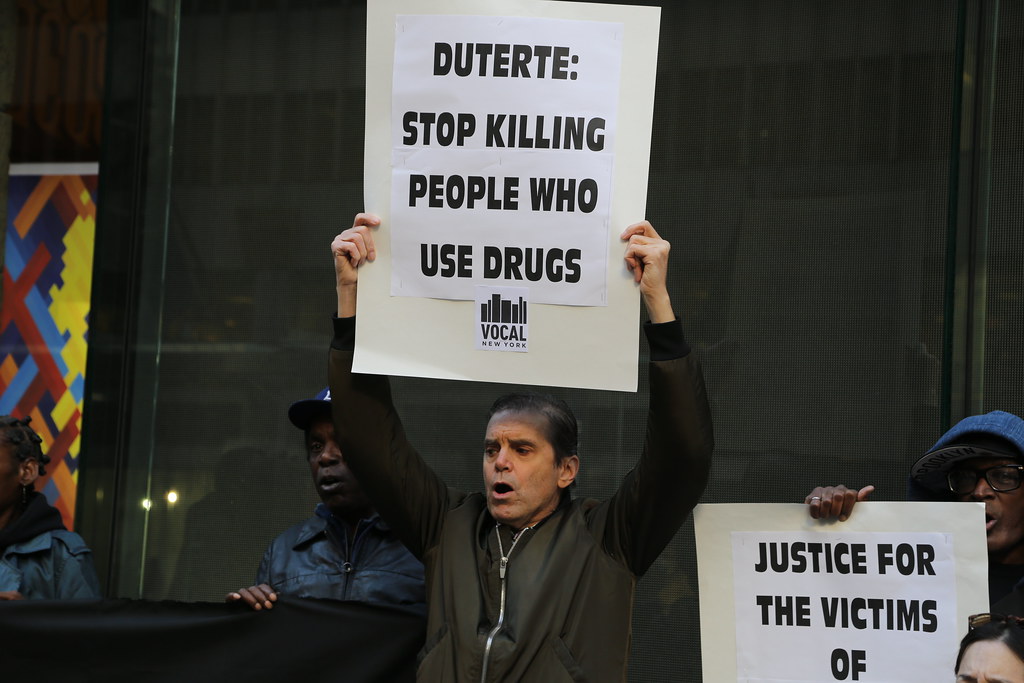Last week another drug bust attempt by police against drug dealers in the Philippines led to violence and at least thirteen people dead. These types of raids and the hardline approach against drug usage have become common in the Philippines under President Rodrigo Duterte. His regime has been widely criticized by the international community for its brutality and the alarming death count.
Duterte ascended to the presidency in 2016 and quickly began rolling out his policy for combatting the significant drug addiction problem in the Philippines. The primary drug that is abused in the Philippines in crystal methamphetamine, known there as “shabu.” The actual level of drug addiction, however, is disputed. The Conversation notes that while Duterte cited a figure of 3 million drug users nationwide, the figure has changed significantly numerous times, and the reporting by the government has been of “poor quality.” Duterte’s policy includes extreme rhetoric about executing drug dealers and users alike, “and throwing their bodies into Manila Bay.” The realities of the violence and death that has occurred is unfortunately not far off from this rhetoric. In the raid last week, the New York Times reports that a “gun battle lasted for hours.” It did note that this was the most violent clash in years, however, numerous human rights organizations have condemned Duterte for the thousands of deaths that have arisen during these anti-drug campaign raids. Human Rights Watch notes over 5500 deaths, while the Philippine police report 8000 deaths, though claiming these were done “in self defense.” Human Rights Watch also notes many thousands more homicides that are “under investigation.”
The government seems split in how it has reacted to widespread condemnation of its practices. Duterte and his supporters, for example, Lieutenant General Archie Gamboa, continue to spread propaganda fiercely in support of the drug war: “saying that police had been too tolerant combating drug offenders and urged officers to “neutralize” them if they felt under threat.” However, in February of 2020 Colonel Romeo Caramat, at that time the head of drug enforcement in the Philippine National Police, discussed with Reuters how he believes that the strategy of going after small-level drug dealers was misguided and ultimately did not actually solve the problem of the sheer quantity of drugs being sold.
An article by the Atlantic, however, seems to call into question this claim as, “unlike in Central America, where drugs are sold by armed gangs, most shabu peddlers here are ordinary men and women for whom selling tiny sachets of meth is more akin to a side business.” This article describes how shabu is a “poor man’s drug,” and notes Duterte’s flagrant bias towards other drugs like heroin and cocaine being more acceptable. In a documentary series, “Inside the World’s Toughest Prisons,” a reporter interviewed prisoners in an extremely overcrowded prison in Manila. Many of the prisoners were there as a result of the drug war, and they did note the involvement of gangs in the drug trade (as a side note, the physical and judicial conditions of this prison were so egregious, and the implications of how the drug war has created those situations so important to understand, that the topic will be covered in a separate article.) Regardless, Duterte’s war on drugs seems predominantly to be a war on the poor. Numerous sources explained that the primary reason for meth becoming so popular amongst young men was so that they could work long hours into the night and make a living. And while gang violence is a significant issue, the Filipino war on drugs is comparable to the American one, in that it targets the result of a problem, rather than the problem itself which still continues to be poverty. Duterte’s “solution” for combating drug usage is the violent killing or imprisonment of thousands. His inflammatory rhetoric only further demonstrates this. It must be pointed out also that there are non-violent drug treatment centers in the Philippines, however they are in some instances far below capacity, and were underfunded significantly.
What is seemingly most perplexing is why so many Filippinos still support Duterte and his policies. Numerous sources noted polls taken that gave him close to 80% approval amid the crackdown. Another article in the Atlantic delved into the reasons for this popularity. The conclusion it reached was that Duterte benefits from the “strongman theory” that other populists have benefited from, and that while many Filipinos dislike his violent approach for reducing crime and drug usage, there is a “perception” that things have become safer under his watch. It further explains the rejection of “liberal democracy” after corruption in past leaders.
Rodrigo Duterte’s anti-drug campaign has led to the death or incarceration of thousands of individuals. The government acknowledges many thousands of these, but rights organizations claim that the actual number could be many times more, given the involvement of clandestine groups supposedly connected to police and their operations. The injustices in the judicial aspect of the drug war regarding trials is further problematic. While the issue of violence and crime created out of poverty is no easy task to defeat, and people experiencing gang violence may understandably feel glad for a reduction in crime, Duterte’s war on drugs should be unequivocally viewed as an enormous violation of human rights, and his regime should be viewed as fascist. The International Criminal Court concurred with this in its investigation of Duterte. Any noticeable improvement in crime rates is negated completely by the utter disregard for human rights and decency. International groups continue to seek justice for these victims.

